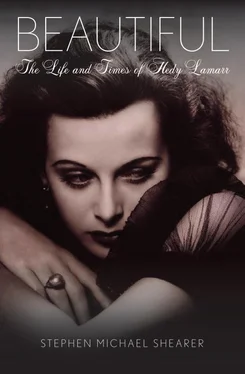“The mind of every German child is crammed with music, and song, legends, folklore and fairy stories, a carnival of the tawdry and the epic, freaks and fairies, wolves and Easter bunnies, the savage and the saccharine,” wrote Angela Lambert in her biography of Adolf Hitler’s mistress and wife, Eva Braun, a contemporary of Hedy. 14“They are first met in the nursery, through haunting melodies and verses whose underlying theme is often violence. The forest, swirling with fog and darkness, populated by wolves, dwarves, witches and satanic figures all looking for small children to waylay—these provide a wonderful insight to the German soul and justify dwelling on them at some length.”
Hedy remembered once when she was three that her father became cross with her. “[I] put on a pretty new hair ribbon which I thought would please him, but it seems he hated bows and he got very angry,” she wrote in Look magazine. 15“I ran like mad and he chased me and hit me. I could never forget this.” She would often run away from home, but only for a few hours. These were the first of many attempted escapes she would make during her lifetime.
Emil told his daughter that if she learned languages and was active in sports, then everything else in life would fall into place. And he would also spend hours patiently explaining to his daughter how things worked, “from printing presses to streetcars,” fostering her inquisitive mind. 16
At age five she began to read. Hedy would devour movie magazines and pretend she was an actress, “like [her] favorites, Norma Talmadge, Gloria Swanson, and Alice White.” 17And she would often practice her dramatics. “I had a little stage under my father’s desk where I would act out fairy tales,” she wrote. “When someone would come into the room they would think my mind was really wandering. I was always talking to myself.” 18
Once Trude promised Hedy that if she was good, Hedy would be rewarded with a nice present, a visit to a theatre. “I saw a stage play for the first time,” Hedy later recalled. “I was thrilled and speechless. I don’t remember the play, its title or anything about it. But I never forgot the first general impression.” 19After that experience, she eagerly took part in school plays and in musical festivals.
Hedy’s favorite playmate was a doll with curly blond hair she named Beccacine. “My pet things were dolls…I loved being with them,” Hedy once told a magazine journalist. 20In Hedy’s solitary youth, often spent playacting, Beccacine became her companion and a fellow thespian. “One day my uncle made fun of me and said, ‘Hedy, it’s only a doll. Don’t be so serious,’” she recalled. “I hated him after that because [the doll] was my only child.” 21Hedy cherished Beccacine and carried it “all over the world” with her well into adulthood. 22
When she was of age, Hedy was enrolled into private elementary school. “Those school days,” she told the writer Gene Ringgold in 1965, “were happy ones. I was both foolish and fanciful and fascinated by the cinema…I vowed to everyone that someday I would be a star.” 23Hedy was always dreaming. And she longed to escape into the world of movies. “As a little child, she would dress up in my clothes and in her father’s suits and hats,” her mother said, and continued: “When she came home from the movies she would act everything she saw there.” 24
Hedy’s maternal grandfather, Karl Lichtwitz, supported her artistic merits. “Grandfather was perhaps the only one who ever encouraged me,” Hedy said in 1938. “He could play the piano, and to his music I danced. It was awkward, my dancing. But he said he thought it was beautiful. The rest of the family gave me little encouragement.” 25
At the end of school terms, Hedy could look forward to vacations at the family summer home in Salzburg. The Kieslers would also take weekend trips to the country lakes to ski, play tennis, and swim. During the winter they would enjoy such outdoor sports as snow skiing and ice-skating and indoor activities like dancing. “The winters we spent in Switzerland were the happiest in my life,” Hedy later said. 26
As a privileged child living in an insulated world, young Hedy always dressed properly in her blue school uniform and was instructed in her mother’s Catholic faith, most likely at Saint Stephan’s Cathedral, home of the famed Vienna Boys’ Choir.
At the end of the war in 1918, Vienna remained largely untouched and much the same as it had been before 1914. After 1919, however, when the Hapsburg monarchy was ended with the signing of the Treaty of Saint Germaine and when the Republic of Austria was established, there followed two decades that saw the steady rise of political strife and poverty. Anti-Semitism was on the increase. The Kieslers’ anxieties for their daughter began to grow.
By 1925, Hedy had developed into a lovely young girl with seductive green eyes and lush dark hair. Since she was a baby, people had remarked on her beauty. “People would flatter me,” Hedy would tell the columnist Gladys Hall in 1941. “In order to overcome that, my mother would tell me about everything I did that was just ‘all right,’ and no more than that. She meant well. She wanted me to be modest.” 27
Hedy was soon becoming a chameleon, willing to change herself to please others. When a boy she was once pursuing eventually took notice of her, she quickly dropped him. “I knew he was in love with me; yes, even when I was ten,” she once told a journalist. “I was at an age when I was dreaming of princes and warriors and heroes and such as I read about in books. And so I just took him for granted. And because I took him for granted, I think I lost something very precious and very real.” 28
Sometimes, though, her allure would have consequences. Years later, while undergoing analysis, Hedy dredged up a particular incident that occurred when she was fourteen years old. The laundryman her family employed in Vienna had at one time tried to rape her. A second time he succeeded, and, according to Hedy’s account, she broke a miniature ivory statue and struck him with it. She did not tell her parents what had happened. According to Hedy, her mother slapped her for not explaining to them why the expensive statue was broken. Hedy held this “pain-shame” memory within her. 29It would affect her whole life, though in her youth she told no one about the incident. She appeared outwardly a normal, ambitious teenage girl.
During the summer of 1929, at her family’s vacation home in Salzburg, fourteen-year-old Hedy fell “in love” for the first time with a young man of twenty-five named Hans, the son of a wealthy family in Vienna, “a Russian boy, very intense about the new ideas and experiments of his country,” Hedy’s mother Trude told a journalist. 30Hans was dating Hedy’s best girlfriend and neighbor Hansi Weiler. As Hedy would remember, “when he saw me at a party, he started paying attention to me, too…I thought he was wonderful. I thought and thought about him in such an idealistic way.” 31
Confronted by both girls, Hedy and Hansi, and forced to choose, Hans made his choice. “It was a very tense moment. He chose me. I was in heaven,” Hedy said. “We had secret meetings, it was all so exciting and romantic, and I was a wiz at deceiving my parents. Once, though, my father caught me coming home late—it must have been nine-thirty.” 32Ever headstrong when it came to “love,” Hedy responded to her mother’s request that she go to her father and apologize by declaring, “I will apologize, I will say the words, but—the thoughts are free!” 33
That year, 1929, Hedy was sent to a private pension , a girls’ finishing school, in Lucerne, Switzerland. Here she would learn discipline and social graces. Students were required to wear black-and-white uniforms and to follow orders. “The rules were strict [and] we made our own beds, kept our own rooms neat and our own clothes in order. The discipline was rigid and good for me,” she told a Warner Bros. publicist in 1944. 34But at the time Hedy was miserable. She was not a poor student, but she was not interested in scholastics either. She would often run away, only to be found and brought, miserable, back to school.
Читать дальше
Конец ознакомительного отрывка
Купить книгу












